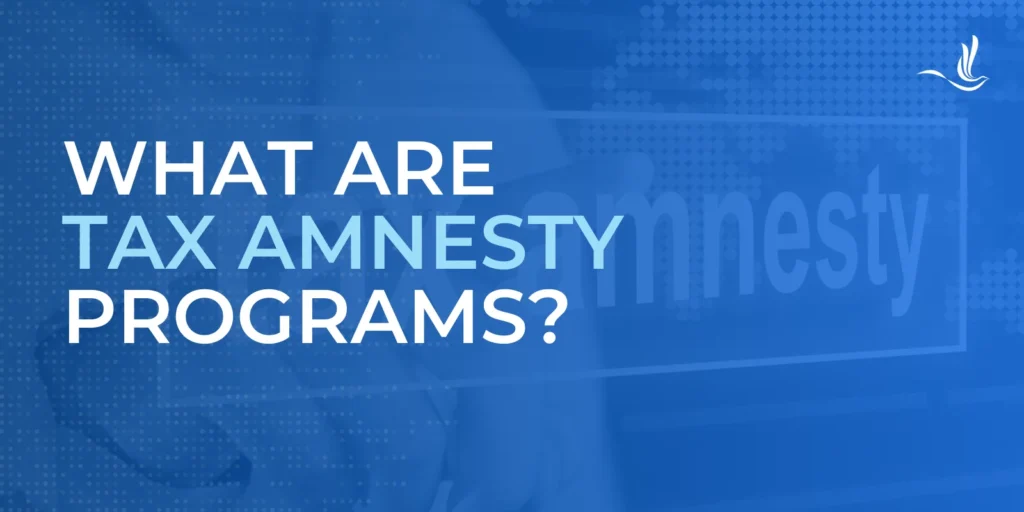Tax amnesty programs are special, time-limited initiatives offered by governments—both federal and state—that give taxpayers the opportunity to settle their outstanding tax liabilities with significant benefits. These programs are designed to encourage voluntary tax compliance. They do this by offering incentives like reduced penalties, interest waivers, or sometimes even immunity from prosecution. Here’s a closer look at what tax amnesty programs are, how they work, and who can benefit from them.
What Is a Tax Amnesty Program?
A tax amnesty program provides individuals and businesses with an opportunity to disclose unreported or underreported income, correct past filing errors, or settle unpaid taxes without facing the full penalties and interest typically associated with these actions. These programs are designed to boost tax revenues.
The key benefit of these programs is that they offer a “clean slate” approach. They basically allow taxpayers to fix their tax situation without the threat of harsh consequences. Depending on the specific program, participants might have penalties reduced or eliminated. They may also avoid criminal prosecution for tax evasion or other offenses.
How Tax Amnesty Programs Work
Each tax amnesty program is different, but they typically follow a similar structure. Taxpayers are usually given a specific window of time to come forward, file the necessary returns, and pay any taxes owed. In exchange, they receive benefits such as:
- Reduction or elimination of penalties. Many tax amnesty programs offer forgiveness for late payment penalties, failure-to-file penalties, or other penalty-related charges.
- Waiver of interest. Some programs also provide partial or full interest waivers, reducing the overall tax bill.
- Protection from prosecution. A key feature of many amnesty programs is the protection from criminal prosecution for past tax violations, which can be a major incentive for taxpayers to come forward.
The program may apply to a wide range of taxes, such as income taxes, property taxes, or sales taxes, depending on the jurisdiction offering the amnesty.
Types of Federal Tax Amnesty Programs
There are several tax amnesty programs offered at the federal level.
IRS Streamlined Procedures
The Streamlined Filing Compliance Procedures are an IRS program designed to help U.S. taxpayers who failed to report foreign income or assets but did so unintentionally. It allows eligible individuals to come into compliance with reduced penalties or no penalties, depending on their residency status. There are two versions:
- Streamlined Foreign Offshore Procedures (SFOP): For U.S. taxpayers living abroad, with no penalties for eligible participants.
- Streamlined Domestic Offshore Procedures (SDOP): For U.S. taxpayers residing in the U.S., with a 5% penalty on the highest balance of unreported foreign assets.
Eligibility requires certifying that the noncompliance was non-willful, meaning the failure was due to negligence or misunderstanding, not intentional evasion. Participants must file amended returns for the past three years and FBARs for the last six years.
Voluntary Disclosure Practice
The IRS Voluntary Disclosure Practice is a program that allows taxpayers to come forward and disclose previously unreported income, underreported assets, or other tax-related violations. By voluntarily disclosing these tax issues before the IRS detects them, taxpayers can often mitigate severe consequences. These can include criminal charges and excessive penalties. The program is open to both individuals and businesses. However, the IRS sets specific criteria for eligibility. For example, you must come forward voluntarily before any investigation, audit, or inquiry is initiated by the IRS. You must also fully disclose all instances of noncompliance, meaning all previously unreported income, assets, and transactions must be revealed. Partial or selective disclosures do not qualify.
Delinquent FBAR Submission Procedures
The Delinquent FBAR Submission Procedures is a program offered by the IRS that allows taxpayers to submit late FBARs (Foreign Bank Account Reports) without facing penalties, provided they meet certain conditions. It is designed for U.S. taxpayers who failed to report foreign bank accounts but have no unreported income from those accounts and have not been contacted by the IRS regarding a missing FBAR. If certain conditions are met, taxpayers can file the missing FBARs, and the IRS typically will not impose penalties. These conditions include:
- The taxpayer must not have previously filed an FBAR for the applicable years.
- They must not owe additional tax on unreported income related to foreign accounts.
- They must not be under civil or criminal investigation by the IRS.
Relief for Certain Former Citizens
The IRS provides Relief for Certain Former Citizens, a program aimed at helping eligible former U.S. citizens to come into compliance without facing steep penalties or being classified as “covered expatriates,” which can result in significant exit taxes under the expatriation tax rules. To qualify, the individual must have had a net worth of less than $2 million at the time of expatriation. Their average annual net income tax liability for the five years prior to expatriation must be below a certain threshold. They must have renounced citizenship after March 18, 2010, and certify that their noncompliance was non-willful. Finally, they must have an aggregate tax liability of $25,000 or less for the taxable year of expatriation and the five prior years.
State Tax Amnesty
State governments frequently roll out amnesty programs to encourage the payment of overdue state taxes such as income taxes, sales taxes, and property taxes. These programs often target taxpayers who are delinquent or who have previously avoided state tax obligations.
Local Tax Amnesty
Some local governments may offer amnesty for unpaid property taxes or other local tax obligations.
Who Can Benefit from a Tax Amnesty Program?
A wide range of taxpayers can benefit from tax amnesty programs. Individuals or businesses that have fallen behind on their tax obligations due to financial difficulties, oversight, or other reasons may find relief. Those who have not filed tax returns for prior years but wish to come into compliance can do so without facing the full penalties. If you have unintentionally (or intentionally) underreported income, participating in an amnesty program can prevent the legal and financial consequences of being audited or prosecuted. For businesses that have failed to remit sales taxes or other types of taxes to the government, tax amnesty offers a way to settle these obligations.
The Drawbacks of Tax Amnesty Programs
While tax amnesty programs offer clear benefits, there are also some potential drawbacks to consider. One is their limited window. Taxpayers must act quickly to take advantage of the benefits. Also, some amnesty programs require public disclosure of participation, which may carry reputational risks for businesses. There is also no guarantee of future programs. If you don’t participate when an amnesty program is available, there’s no guarantee that the government will offer another in the future.
Tax Help for Those Who Owe
Tax amnesty programs provide a valuable opportunity for taxpayers to resolve their tax liabilities with reduced penalties and favorable terms. They encourage voluntary compliance, which benefits both the taxpayer and the government. However, the opportunity is often short-lived, so it’s important to act quickly if a tax amnesty program is available. If you’re considering participating in a tax amnesty program, consult with a tax professional to fully understand the terms and determine whether it’s the right decision for your financial situation. Optima Tax Relief is the nation’s leading tax resolution firm with over $3 billion in resolved tax liabilities.
If You Need Tax Help, Contact Us Today for a Free Consultation
Publisher: Source link











